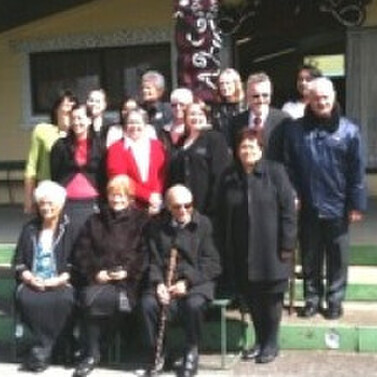NZARE GROUP AWARD
The award recognises a significant educational research project undertaken in Aotearoa by a group of researchers for their contribution to the body of knowledge in educational research. First awarded in 2004, the award comprises a written citation, a taonga and a cash prize of $1000.

In granting this award NZARE welcomes nominations from a wide range of research groups but will prioritise Māori or Pasifika education research projects.
Nominations
At least two members of the nominated group must be current members of NZARE. The nominator(s) must also be current member(s) of NZARE, and any member to make the nomination.
a letter of nomination from the NZARE nominator
substantive written details of the group research projects(s)
appropriate citations and letters of support
email, postal, phone details of nominators and nominees
a recent colour photo of nominees
current NZARE membership details of at least two nominees and the nominator(s) details
Selection
A selection panel is selected annually. the panel should contain at least one council member and/or Caucus member as appropriate, and may also contain external NZARE members.
A sub-committee will be appointed to received and consider the nominations and make a recommendation to council regarding conferring the award. The final decision must be ratified by the council.
The Council retains the right to make no award in any one year;
The Award will be conferred at the NZARE annual conference, and notified in the Association's newsletter and on its website;
The successful applicant(s) and their nominators will be informed of the award prior to the annual NZARE conference. Unsuccessful applicants are notified by email and/or letter after the selection process has been completed;
The Council’s decision is final and no correspondence will be entered into.
Criteria for selection
The research has been undertaken by a group and makes a quality contribution to the body of knowledge in educational research.
The research work has been undertaken in Aotearoa / New Zealand and has clear implications for Aotearoa / New Zealand education.
The research group has established a culture and environment that extends the knowledge and skills of the research group and the wider research community.
The research work contributes to educational knowledge, policy and/or practice.
The research is collaborative between researchers and participants.
In the case where the focus is either Māori or Pasifika education research, we expect that the research design has been co-constructed with Māori (mana whenua) or Pasifika (mana moana) representatives.
The successful applicant
will be informed of the award prior to the annual NZARE conference. Unsuccessful applicants will be notified by email and/or letter after the selection process has been completed and the successful candidate has accepted the award.
2022
No Award made
2021
Developing Mathematical Inquiry Communities team: Citation
2020
No Award made
2019
No Award made
2018
No Award made
2017
University of Waikato: Te Kotahitanga Research Institute
2016
University of Canterbury: Te Rū Rangahau: Citation
2015
University of Waikato: Te Kotahitanga Research Institute
2014
No Award made
2013
No Award made
2012
The University of Auckland: Success for All: Citation
2011 - 2009
No Award made
2008
Pasifika Group Research
2007
Ministry of Education: Comparative Education Research Unit: Citation
2006
Amosa Fa'afoi, Faye Parkhill, Jo Flecher, Christchurch College of Education
2005
No Award made
2004
Poutama Pounamu Research Institute
2015
he 2015 Group Award recipients were the University of Waikato's Te Kotahitanga Research and Professional Development Team. Professor Russell Bishop, Associate Professor Mere Berryman, Therese Ford, Margaret Egan, Dawn Lawrence, Te Arani Barrett, Iti Joyce, Robbie Lamont.
The use of kaupapa Māori principles and methodologies, as well as the volition to establish productive Treaty-based partnerships with non-Māori, has resulted in indigenous expertise driving culturally responsive provision for Māori students in New Zealand secondary school contexts. Recognised across and within communities locally, nationally and internationally, Te Kotahitanga as a research and professional development initiative, has made a major impact on Māori students’ levels of engagement and achievement. In doing so the Te Kotahitanga team has been successful in supporting schools and their communities to reduce educational disadvantage and disparity.
The 2012 Group award recipients were The University of Auckland's Success for All. Research team members included Dr Airini, Dr Deidre Brown, Dr Elana Curtis, Fred Luatua, Mona O’Shea, Dr Te Oti Rakena, Gillian Reynolds, Tanya Savage, Angie Smith, Matthew Tarawa and Sonia Townsend-Fonua with current and former University of Auckland colleagues: Odie Johnson, Pale Sauni, To’aiga Su’a Huirua, Meryl Ulugia-Pua, Sofi Ulugia-Pua.
2012
The 2012 Group award recipients were The University of Auckland's Success for All. Research team members included Dr Airini, Dr Deidre Brown, Dr Elana Curtis, Fred Luatua, Mona O’Shea, Dr Te Oti Rakena, Gillian Reynolds, Tanya Savage, Angie Smith, Matthew Tarawa and Sonia Townsend-Fonua with current and former University of Auckland colleagues: Odie Johnson, Pale Sauni, To’aiga Su’a Huirua, Meryl Ulugia-Pua, Sofi Ulugia-Pua.
